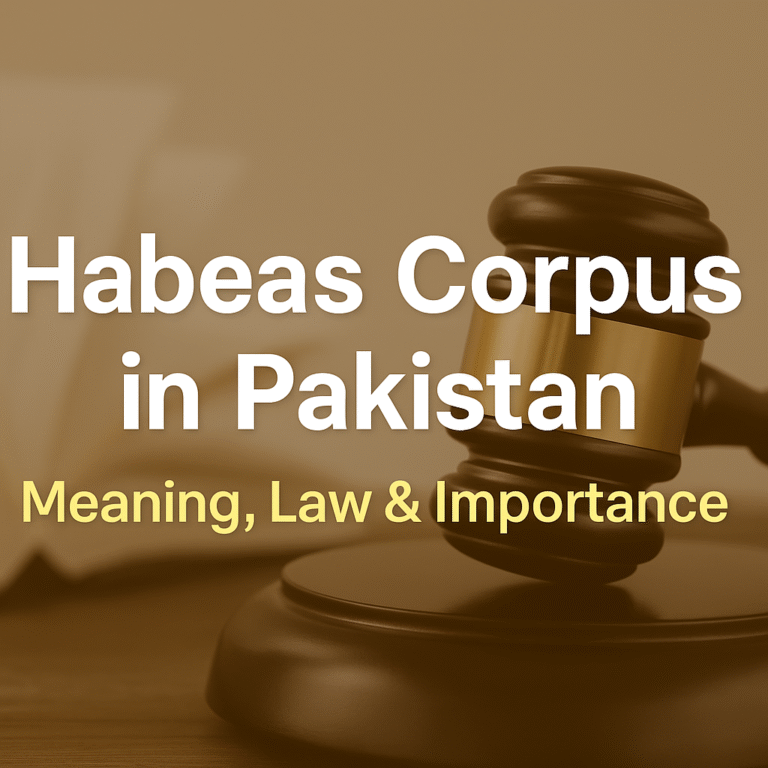Habeas Corpus in Pakistan – A Shield of Freedom and Justice

Introduction
Every democracy is built upon one central principle — the protection of personal liberty. Without it, justice becomes meaningless, and power turns oppressive. In Pakistan, one of the strongest safeguards of this liberty is the writ of habeas corpus. It is more than just a legal term; it is the voice of those who cannot speak for themselves — the unlawfully detained, the disappeared, and the forgotten.
This article explores what habeas corpus means, where it came from, how it developed in Pakistan, and why it continues to play a crucial role in defending the rights of citizens today.
What Is Habeas Corpus?
The phrase “Habeas Corpus” originates from Latin and literally means “you may have the body.”
In legal terms, it refers to a court order requiring that a person under arrest be brought before a judge. The purpose is simple yet powerful — to determine whether the detention is lawful.
If the court finds no legal justification for the arrest or confinement, it orders the person’s immediate release. In essence, habeas corpus ensures that no one in a civilized society can be thrown into a cell or “disappeared” without the law having its say.
It is often called the “Great Writ of Liberty”, and rightly so — it transforms the promise of freedom into a practical right.
Historical Background: From Magna Carta to Modern Constitutions
The roots of habeas corpus stretch deep into English history. The idea first appeared in the Magna Carta of 1215, when King John agreed that “no free man shall be imprisoned or detained, except by the lawful judgment of his peers or by the law of the land.”
Over the following centuries, English judges developed the principle into a formal legal remedy. The Habeas Corpus Act of 1679, passed by the British Parliament, finally gave it statutory recognition. This Act made it illegal for the King or his officials to imprison anyone arbitrarily and required them to justify every detention before the courts.
As the British Empire spread, this principle traveled with it — influencing the constitutions of the United States, India, and later, Pakistan.
Habeas Corpus under Pakistan’s Constitution
When Pakistan gained independence in 1947, it inherited the British common-law system. With the adoption of the Constitution of 1973, habeas corpus became enshrined as a fundamental right.
Under Article 199(1)(b)(i), every High Court in Pakistan has the authority to issue a writ of habeas corpus. In simple terms, this means that if any person believes someone is being illegally detained, they can approach the High Court to demand that the detainee be brought before it.
Furthermore, the Supreme Court of Pakistan can also act under Article 184(3) when questions of fundamental rights — particularly the right to life and liberty guaranteed under Article 9 — are involved.
Together, these provisions make habeas corpus one of the strongest constitutional protections available to Pakistani citizens.
How Habeas Corpus Works in Practice
If a person goes missing or is arrested without charge, their relatives or any concerned citizen can file a petition for habeas corpus in the High Court.
Once the petition is filed:
The court issues a notice to the detaining authority (such as the police or intelligence agency) to produce the detainee before the court.
The authority must explain the legal grounds for the detention.
If the court finds that the arrest violates the law, it can order the immediate release of the detainee.
This process is meant to be swift and straightforward, as any delay in producing the detainee defeats the very purpose of the writ.
Habeas corpus is not limited to political cases or criminal matters. It is also used in:
Child custody disputes, where one parent unlawfully keeps the child against a court order.
Civil detentions, such as confinement in rehabilitation or mental-health facilities without proper procedure.
Cases of missing persons, where individuals allegedly picked up by law-enforcement agencies are not produced in court.
The Role of Pakistan’s Judiciary
Pakistan’s courts have played an essential role in strengthening the power of habeas corpus and expanding its reach beyond traditional boundaries.
Early Judicial Recognition
One of the foundational cases was Zahid Rehman v. State (PLD 1985 SC 530), where the Supreme Court reaffirmed that habeas corpus is a constitutional guarantee ensuring that no one can be deprived of liberty except through due process.
Enforced Disappearances and Missing Persons
Since the early 2000s, hundreds of habeas corpus petitions have been filed in Pakistan concerning enforced disappearances, particularly in Sindh, Balochistan, and Khyber Pakhtunkhwa.
In these cases, families claim their loved ones have been taken by law-enforcement or intelligence agencies and kept in secret detention centers.
The Supreme Court of Pakistan, led by justices such as Chief Justice Iftikhar Muhammad Chaudhry, took suo-motu actions to trace missing persons, summon officials, and demand accountability.
The Sindh High Court and Islamabad High Court have also delivered numerous judgments ordering the recovery or production of missing individuals.
Even though not all orders are promptly implemented, the judiciary’s activism has helped keep the issue in public focus and forced authorities to acknowledge accountability.
Habeas Corpus and Human Rights
Habeas corpus is not only a legal procedure; it is also a human-rights safeguard. It aligns with international obligations under the International Covenant on Civil and Political Rights (ICCPR), to which Pakistan is a signatory.
Article 9 of the ICCPR guarantees that “anyone who is deprived of liberty shall be entitled to take proceedings before a court, in order that the court may decide without delay on the lawfulness of his detention.”
By recognizing and applying habeas corpus, Pakistan fulfills its duty to protect the right to liberty — a right that cannot be suspended even during emergencies.
Modern Challenges
Despite its importance, the implementation of habeas corpus in Pakistan faces several obstacles:
1. Delayed Proceedings
Although the writ is meant to provide immediate relief, procedural delays often result in prolonged detentions. Some cases linger for months before a detainee is even located.
2. Non-Compliance with Court Orders
In cases involving powerful agencies or political interests, court orders for production of detainees are sometimes ignored. This weakens the judiciary’s authority and undermines public confidence.
3. Lack of Accountability
Even when courts declare a detention illegal, there are few mechanisms to hold responsible officers accountable. Without punishment or consequences, unlawful arrests continue.
4. Fear and Social Pressure
Families of missing persons often face intimidation or are discouraged from pursuing legal remedies. This discourages others from coming forward.
5. Need for Legislative Reform
While courts can provide relief, long-term solutions require legislation. Pakistan has proposed an Enforced Disappearances Act, but its enforcement remains inconsistent.
Public Awareness and Civil Society
Civil-rights organizations, such as the Human Rights Commission of Pakistan (HRCP) and Amnesty International, continue to campaign for the stronger implementation of habeas corpus.
They provide legal assistance to families of detainees and document violations where citizens have “disappeared” or been held without trial.
Media coverage and social-media activism have also brought national attention to the issue, making habeas corpus not just a legal topic but a matter of public conscience.
Comparative Insight: How Other Countries Apply Habeas Corpus
To appreciate Pakistan’s progress and challenges, it helps to look abroad:
| Country | Constitutional Basis | Authority | Scope of Use |
|---|---|---|---|
| United Kingdom | Habeas Corpus Act 1679 | High Court | Any unlawful detention by the state |
| United States | Article I, Section 9, U.S. Constitution | Federal & State Courts | Civil, military, immigration detentions |
| India | Articles 32 & 226 of the Constitution | Supreme Court & High Courts | Against state or private individuals |
| Pakistan | Articles 199 & 184(3) of the Constitution | High Courts & Supreme Court | Unlawful detention, missing persons, child custody |
Pakistan’s system mirrors other common-law jurisdictions but faces more practical barriers in enforcing judicial directions.
Why Habeas Corpus Still Matters
In a world where state power often grows faster than public accountability, habeas corpus remains the last line of defense between freedom and fear.
For ordinary citizens, it represents hope — the assurance that the law will protect them even when the powerful overstep.
For the judiciary, it is a test of independence and courage.
And for the nation, it is a reminder that democracy cannot survive without justice and human dignity.
The continued use of habeas corpus petitions by Pakistan’s High Courts is a sign that the spirit of the Constitution is alive, even in difficult times. Whether it’s a missing activist, a detained journalist, or a parent separated from a child, this writ allows people to stand before the law and say, “Show us the reason, or set them free.”
Conclusion
The story of habeas corpus in Pakistan is not just about courtrooms and legal arguments — it’s about the struggle for freedom, accountability, and respect for human life.
Despite challenges like enforced disappearances and institutional resistance, the writ continues to function as a shield of justice for citizens.
Every time a judge orders a detainee to be produced, every time a family’s plea is heard, and every time an unlawful detention is overturned, habeas corpus reminds us that no one is above the law.
It is, and must remain, the heartbeat of liberty in Pakistan’s democratic system.
Habeas corpus law Pakistan, Article 199 Constitution of Pakistan, Missing persons Pakistan, Human rights and habeas corpus, Writ petition Pakistan, Fundamental rights in Pakistan
Contact Us Today!
Habeas corpus law Pakistan, Article 199 Constitution of Pakistan, Missing persons Pakistan, Human rights and habeas corpus, Writ petition Pakistan, Fundamental rights in Pakistan
Habeas Corpus in Pakistan — FAQs
Habeas corpus is a court order requiring that a detained person be produced before a judge so the court can check whether the detention is lawful. If it isn’t, the court orders immediate release.
All Provincial High Courts can issue the writ under Article 199 of the Constitution. The Supreme Court may also intervene under Article 184(3) in matters of fundamental rights.
The detainee, a family member, or any concerned person (next friend) with knowledge of the detention can file it.
File when a person is arrested or picked up without charge, not produced before a magistrate within required time, held beyond remand, or kept in secret/unauthorised custody.
Yes. Families often use habeas corpus to seek production/recovery where a person is allegedly picked up and not produced before any court.
Yes. If a child is unlawfully removed/retained against a lawful guardian or court order, High Courts frequently use habeas corpus to secure the child’s production and pass appropriate orders.
CNIC copies of the petitioner and detainee, proof of relationship, last-seen or detention details (FIR/DD entry if any), medical/education documents (for minors), and any correspondence or witness statements. An affidavit is required.
Generally in the High Court having territorial jurisdiction where the detention/abduction occurred, or where the respondent authority is located.
Courts usually issue notice and production orders promptly because habeas corpus protects liberty; urgent/hearing on short date is common. Actual timelines depend on facts and compliance by authorities.
Production of the detainee, immediate release if detention is illegal, placement in a shelter/home (in child cases), medical examination, registration of FIR, or direction for inquiry/disciplinary action.
Yes. If a person, including a parent/relative, unlawfully confines someone (especially minors), the writ may be issued against private parties as well.
No. Bail challenges custody during a criminal case; habeas corpus challenges the legality of the detention itself (with or without a registered case).
Non-compliance can lead to contempt proceedings and directions to senior officials/IGs. Courts may also order inquiries or compensation in appropriate cases.
If detention is under a valid judicial order or lawful remand, habeas corpus does not replace the proper appellate/revision remedies. The writ targets illegal or mala fide custody.
While not legally compulsory, a lawyer is strongly recommended to draft the petition correctly, choose proper respondents, and seek appropriate relief.
Articles 9 (security of person), 10 & 10-A (due process/fair trial), 14 (dignity of man), 199 (High Court writ jurisdiction), and 184(3) (Supreme Court) collectively support habeas corpus.


No comment yet, add your voice below!